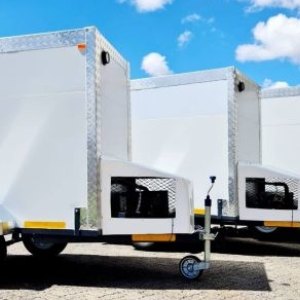Mobile Chillers For Sale
Mobile chillers, or portable chillers, have emerged as indispensable cooling systems across a wide range of industries. Their primary function is to provide efficient and precise temperature control for processes, products, or equipment that require cooling. These compact, transportable units offer the flexibility to be moved between locations, making them ideal for temporary setups or industries with varying cooling needs. Mobile chillers are commonly used in event management, food and beverage industries, pharmaceuticals, and manufacturing environments where temperature regulation is critical.
There are three main types of mobile chillers: air-cooled, water-cooled, and self-contained units. Air-cooled chillers are known for their convenience and ease of installation since they do not require external water sources. They are best suited for quick deployments in environments where access to water may be limited. Water-cooled chillers, on the other hand, are more energy-efficient and can handle larger cooling loads but require a steady supply of water. Self-contained chillers offer a balance between the two, combining pumps and controls in one unit to provide a highly flexible solution that can be used in diverse applications.
Mobile Chillers Manufacture
One of the most significant benefits of mobile chillers is their energy efficiency, especially in industries where cooling is vital to maintaining product quality or preventing machinery from overheating. Mobile chillers are also cost-effective because they eliminate the need for permanent cooling systems, reducing both initial capital and long-term operational costs. Their easy installation and mobility make them an ideal choice for industries that require flexible, scalable cooling solutions, especially when operating across multiple locations or in temporary settings such as events or remote construction sites.
Maintaining mobile chillers is critical for ensuring their longevity and optimal performance. Regular tasks include cleaning coils, checking refrigerant levels, inspecting electrical systems, and monitoring for leaks or mechanical failures. Adhering to a proper maintenance schedule can prevent common issues such as refrigerant leaks, electrical faults, and compressor malfunctions, which can cause costly downtime. By performing these routine checks, businesses can maximize the operational efficiency of mobile chillers while extending their lifespan.
Frequently Asked Questions (FAQs):
Q1: What are mobile chillers used for?
A: Mobile chillers are used for cooling in various industries, including food storage, pharmaceuticals, industrial manufacturing, and event management. They help regulate temperatures and prevent equipment from overheating.
Q2: What is the difference between air-cooled and water-cooled chillers?
A: Air-cooled chillers use air to dissipate heat and are easier to deploy, while water-cooled chillers use water, offering higher energy efficiency but requiring access to a water source.
Q3: How do I choose the right mobile chiller for my needs?
A: Key factors to consider include the cooling capacity, energy efficiency, installation space, portability, and the specific cooling needs of your application. Noise levels and ease of maintenance are also important considerations.
Q4: How often should I service my mobile chiller?
A: It is recommended to service mobile chillers based on manufacturer guidelines, typically involving regular cleaning, inspections, and replacement of worn-out parts to maintain efficiency and prevent breakdowns.
Q5: What are common maintenance tasks for mobile chillers?
A: Key maintenance tasks include cleaning coils, checking refrigerant levels, inspecting electrical components, and ensuring there are no leaks or blockages in the system.


